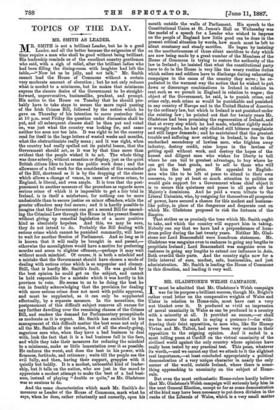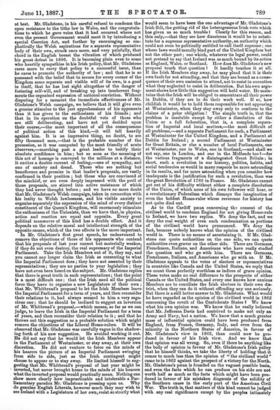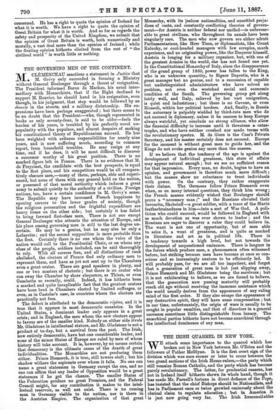MR. GLADSTONE'S WELSH CAMPAIGN.
TT must be admitted that Mr. Gladstone's Welsh campaign was for its purpose a brilliant success, though Mr. Bright's rather cruel letter on the comparative weights of Wales and. Ulster in relation to Home-rule, must have cast a very wet blanket over it. It produced as vivid an impression of moral unanimity in Wales as can be produced in a country with a minority at all. It provided an excuse,—or shall we be nearer the mark in saying a pretence ?—for with- drawing their faint opposition, to men who, like Sir Hussey Vivian and Mr. Talbot, had never been very serious in their opposition to the reigning opinion. And it ended in a most telling paaan at Cardiff on the virtual unanimity of the civilised world against the only country whose opinions have really been tested by any practical test. This paan, whatever its worth,—and we cannot say that we attach to it the slightest real importanee,—at least concluded appropriately a political demonstration of a very unique character in nearly the only corner of the world, outside Ireland, where there is some- thing approaching to unanimity on the subject of Home- rule.
But even the most enthusiastic Home-rulers hardly believe that Mr. Gladstone's Welsh campaign will seriously help him in the next General Election, except so far as some demonstration of the kind may have been necessary to put down division in the ranks of the Liberals of Wales, which is a very small matter
at best. Mr. Gladstone, in his careful refusal to condemn the open resistance to the tithe law in Wales, and the congratula- tions to which he gave voice that it had occurred where not even the present Government would meet it by introducing a special Coercion Act, and further by encouraging so em- phatically the Welsh aspirations for a separate representative body of their own, struck once more, and very painfully, that chord in the English breast the vibration of which produced his great defeat in 1886. It is becoming plain even to some who heartily sympathise in hie Irish policy, that Mr. Gladstone cares more to carry that policy to a successful issue, than he cares to promote the authority of law ; and that he is so possessed with the belief that to secure for every corner of the Kingdom some separate and visible will of its own, is a good in itself, that he has lost sight altogether of the danger of fostering self-will, and of breaking up into incoherent frag- ments the organised expression of national conviction. Without disputing for a moment the immediate effectiveness of Mr. Gladstone's Welsh campaign, we believe that it will give even a greater stimulus to the just apprehensions of his opponents than it has given to the enthusiasm of his friends ; and that in its operation on the doubtful vote of those who are still deliberating, and have not yet decided upon their course,—the most important of all the consequences of political action of this kind,—it will tell heavily against him. It is an impressive thing, no doubt, to see fifty thousand men,—that is the probable number of the procession, as it was computed by the most friendly of acute observers,—marching past a great leader to testify their absolute confidence in him ; but so soon as the meaning of this act of homage is conveyed to the millions at a distance, it excites a double current of feeling,—one of sympathy, and one of anxiety and dread. Those who see nothing but beneficence and promise in that leader's proposals, are vastly confirmed in their position ; but those who are convinced of the mischief, or are even deeply impressed with the peril of those proposals, are stirred into active resistance of which they had never thought before ; and we have no more doubt that Mr. Gladstone's Welsh campaign, taken in connection with his lenity to Welsh lawlessness, and his visible anxiety to organise separately the expression of the mind of every distinct constituent of the Queen's Kingdom, will enormously stimulate the enthusiasm of the Unionists, than we have that, in physics, action and reaction are equal and opposite. Every great political manceuvre of this kind has a double effect. And it depends on the relative moral and intellectual strength of the opposite causes, which of the two effects is the more important.
In Mr. Gladstone's first great speech, he endeavoured to remove the objections of those of his opponents who contend that his proposals of last year cannot but materially weaken, if they do not even destroy, the real supremacy of the Imperial Parliament. Take the Irish Members out of it, they say, and you cannot any longer claim the Irish as consenting to what the Imperial Parliament does ; they have not assented by their representatives ; they are no parties to your legislation ; they have not even been heard on the subject. Mr. Gladstone replies that there is great truth in such representations; that the point is a moat difficult one ; that the Irish need all the political force they have to organise a new Legislature of their own ; that Mr. Whitbread's proposal to let the Irish Members leave the Imperial Parliament for a term of years, and then reconsider their relations to it, had always seemed to him a very saga- cious one ; that he should be inclined to suggest an inversion of Mr. Whitbread's proposal,—which means, so far as we can judge, to leave the Irish in the Imperial Parliament for a term of years, and then reconsider their relation to it ; and that he throws out this suggestion as a probable solution which might remove the objections of the Liberal Home-rulers. It will be observed that Mr. Gladstone was carefully vague in the shadow- ing forth of his new suggestion. He avoided working it out. He did not say that he would let the Irish Members appear in the Parliament of Westminster, or stay away, at their own discretion. He did not venture to force on the minds of his hearers the picture of an Imperial Parliament swinging from side to side, just as the Irish contingent might choose to appear or to stay away. He limited himself to sug- gesting that Mr. Whitbread's proposal of last year might be inverted, but never brought home to the minds of his hearers what the inverted proposal would practically mean. Nothing can show snore clearly how impracticable and intolerable a Par- liamentary paradox Mr. Gladstone is pressing upon us. Why do genuine English Liberals, however much they may wish to see Ireland with a Legislature of her own, resist so stoutly what
would seem to have been the one advantage of Mr. Gladstone's Irish Bill, the getting rid of the heterogeneous Irish vote which has given us so much trouble? Clearly for this reason, and this only,—that they see how disastrous it would be to substi- tute for a supreme representative authority, an authority which could not even be politically entitled to call itself supreme; one whose laws would morally bind part of the United Kingdom bat not the other part ; one which, whatever its legal power, could not pretend to say that Ireland was as much bound by its action as England, Wales, or Scotland. How does Mr. Gladstone's new
proposal touch that question It hardly touches it at all. If the Irish Members stay away, he may plead that it is their own fault for not attending, and that they are bound as a conse- quence of their own omission to attend, not to resist in execution what they neglected to resist in deliberation. But his own argu- ment shows how little this suggestion will hold water. He main- tains that the Irish will be obliged to concentrate all their power in Dublin, if they are to do their work well. If so, how childish it would be to hold them responsible for not appearing at Westminster, when they stay away only to conform to the claims of a prior obligation! The simple truth is, that the problem is insoluble except by either a dissolution of the Union or a full federation, that is, a complete separa- tion of Imperial and local mattere,—the most difficult of all problems,—and a separate Parliament for each, a Parliament at Westminster for the United Kingdom, and a Parliament at Dublin for Ireland ; a second Parliament at Westminster for Great Britain, or else a number of local Parliaments, one at Westminster, one in Wales, one in Scotland,—and shall we not say, one in London, and one in the Midlands tool—for the various fragments of a disintegrated Great Britain ; in short, such a revolution in our history, politics, habits, and social tendencies as would in many respects be more astounding in its results, and far more astounding when you consider how inadequate is the justification for such a revolution, than was the great Revolution of 1789 in France. Mr. Gladstone cannot get out of his difficulty without either a complete dissolution of the Union, of which none of his own followers will hear, or a revolutionary Federalism which dismays the imagination of even the boldest Home-rider whose reverence for history has not quite died out.
As to the Cardiff paean concerning tics consent of the civilised world to condemn England for not giving Home-rule to Ireland, we have two replies. We deny the fact, and we deny the real weight of even such condemnation as portions of the civilised world have pronounced. We deny the fact, because nobody knows what the opinion of the civilised world is. There is no means of ascertaining it. If Mr. Glad- stone can quote authorities on the one aide, we can quote authorities even graver on the other side. There are Germans, Frenchmen, Italians, and Americans who have really studied the question and who go with him. There are Germans, Frenchmen, Italians, and Americans who go with us. If Mr. Gladstone appeals to the votes of electors or representatives in countries like Canada and the United States, we reply that we count these perfectly worthless as indices of grave opinion. These votes make no real difference to the prospects of either Canada or the United States, and every one knows how anxious Members are to conciliate the Irish electors in their own dis- trict, when they can do it without offending any one seriously. But there is a still better answer to Mr. Gladstone. What would he have regarded as the opinion of the civilised world in 1862 concerning the revolt of the Confederate States I We know what his own opinion was. We know that he really believed that Mr. Jefferson Davis had contrived to make not only an Army and Navy, but a nation. We know that a much greater mass of influential opinion could have been produced from England, from France, Germany, Italy, and even from the minority in the Northern States of America, in favour of Mr. Gladstone's view in 1862, than could now be pro- duced in favour of his Irish view. And we know that that opinion was all wrong. So, even if there be anything like the body of opinion in favour of Mr. Gladstone's Irish policy that he himself thinks, we take the liberty of holding that it comes to much less than the opinion of "the civilised world" came to in 1862 against the prospect of a victory for the North. Mr. Gladstone's peen is founded on the vaguest possible basis, and even the facts which he can produce on his side are not worth half as much as the facts which might have been pro- duced in favour of his mistaken diagnosis of the solidity of the Southern cause in the early part of the American Civil War. The truth is, that matters of this kind cannot lie judged with any real significance except by the peoples intimately
concerned. He has a right to quote the opinion of Ireland for what it is worth. We have a right to quote the opinion of Great Britain for what it is worth. And so far as regards the safety and prosperity of the United Kingdom, we submit that the opinion of Great Britain is worth, both numerically and morally, a vast deal more than the opinion of Ireland ; while the floating opinion hitherto elicited from the rest of "the civilised world" is worth little or nothing.




































 Previous page
Previous page